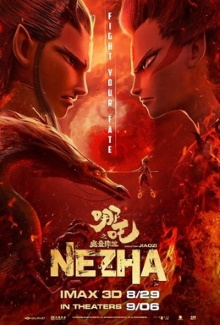
As I’ve mentioned on Broken Forum, Ne Zha can be thought of as China’s current best answer to Marvel and Pixar. It predictably sold well in China but performance outside of it has been lacklustre. Non-Chinese audiences probably found the title mystifying and I have to say that its trailer looks unimpressive as well. I was prepared to critique this heavily but ended up being rather surprised at how decent it is.
An orb of energy spontaneously forms out of primordial chaos and the deific Tianzun dispatches his disciples Taiyi Zhenren and Shen Gongbao to deal with it. In the end, Tianzun is still forced to separate the orb into two good and evil halves himself. He further orders that the good half be used to incarnate into the son of a favored human noble Li Jing who will then be tutored by Taiyi Zhenren and that the evil half will be destroyed by heavenly lightning in three years time. However Shen Gongbao is upset with this decision and switches them, sending the evil half into the wife of Li Jing, resulting in the birth of Ne Zha. He brings the good half to the Dragon King to be born as Ao Bing as part of a plot to help the dragons escape the underworld. Ne Zha grows up to a demonic child with an uncontrollable temper and terrorizes the local populace, forcing his parents to imprison him. Ao Bing meanwhile is secretly tutored by Shen Gongbao. At this point, we all know that a confrontation between the two is inevitable.
As I understand it, this version of the story represents a substantial change from the source material such as for example making Ne Zha’s father a sympathetic rather than an antagonistic character. I think these changes are actually for the better and the themes of both filial piety and defying one’s destiny are quite solid. The relationship between Ne Zha and Ao Bing with elements of rivalry and brotherhood is a familiar one in Asian fiction but it’s a good update on the original story. Unfortunately the sense of humor here is rather infantile with mostly uninteresting characters in obligatory cutesy roles. I also don’t really understand the worldbuilding in these stories, such as who Tianjun represents or why they are helping Li Jing and so on. It seems that they expect audiences to just accept this from prior knowledge of the source material but I suspect it also makes it a hard sale for foreign audiences.
Technologically, this production still falls far short of Pixar’s current state of the art. From my small bit of experience with Blender, it seems to me that for example they’re not using subsurface scattering on skin shaders, resulting in skin tones that look flat. They also need to invest in using motion capture for everything including facial expressions to give the characters more realistic emotions. More disappointing is the uneven art direction. The world of presumably ancient China depicted looks strangely bland and uninteresting. Yet they also have scenes of a world within a painting which they cleverly present as a sort of videogame-like virtual reality where they can train Ne Zha in the use of his powers without incurring collateral damage. Those scenes look so stunning and dynamic that one wonders why didn’t go with that level of vibrant energy for the whole film.
What is indisputably great here are the fight scenes. I continue to be surprised that Hollywood, even after decades of effort, still cannot manage to film good martial arts scenes without calling in Asian specialists. Ne Zha has probably the best fight choreography I’ve seen in any animated film. I mean, normally two super powerful characters throwing huge attacks at each other just look dumb, but this film actually sells it. There is a decent variety of different powers and feats, each character has well defined abilities and uses them intelligently, it’s all very satisfying to watch.
Overall it can’t compare to the best that Marvel or Pixar can offer but it stands up surprisingly well to the more middling ones. It’s not great cinema and I wouldn’t expect anyone to walk away with teary eyes, but it’s decent entertainment and at times offers a truly exceptional spectacle. I do find it strange that the director and scriptwriter is credited to the same name, but it’s clearly a pseudonym. There must be some kind of story going on behind the scenes. In any case, the Chinese filmmaking industry can only improve from here and it’s only a matter of time until they achieve parity at least on a purely technical level.